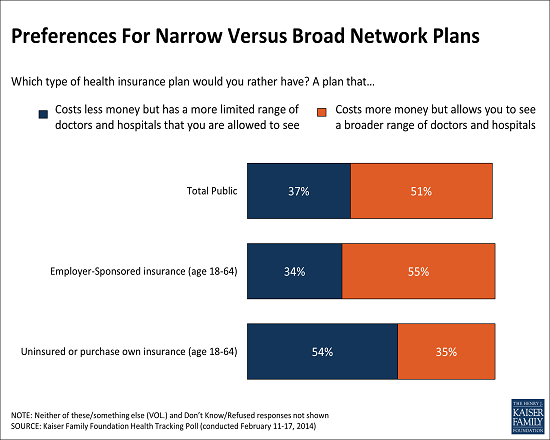Most Potential Marketplace Shoppers Favor Narrower Networks With Lower Costs Over Broad Doctor and Hospital Networks, But the Reverse is True for the Public At Large, Kaiser Tracking Poll Finds
Public’s Favorability of the Affordable Care Act Has Not Rebounded Since Fall Slide, But a Majority, Including Most Independents, Want to Keep or Improve the ACA Rather Than Repeal It
The February Kaiser Health Tracking Poll finds that the people most likely to buy coverage through the Affordable Care Act's new insurance marketplaces are more willing than the public at large and people with employment-based coverage to accept a narrow network of doctors and hospitals in exchange for lower costs.
Overall, more people say they would rather have a plan that costs more money but allows them to see a broader range of doctors and hospitals (51%) than a less-expensive plan that allows them to visit a narrower network of providers (37%).
However, people who are uninsured or who purchase their own coverage directly -- the target customers for the new marketplaces -- see the tradeoff differently. A majority (54%) of this group says they prefer less costly, narrow network plans to more costly broad network ones, compared to just over a third (35%) who feel the other way. In general, older people and those with higher incomes show a clear preference for broad networks, even if they cost more, while younger people and those with lower incomes are more evenly divided.

While narrow network plans pre-date the Affordable Care Act (ACA), the issue has gotten renewed attention as consumers weigh their options on the health insurance marketplaces. The poll's findings may help explain why some insurers competing for customers in marketplaces chose to offer plans with relatively narrow networks of physicians and hospitals.
Those who prefer narrow-network plans may be less likely to do so if it means they can’t see their usual providers. When those who prefer a less costly narrow network plan are presented with the possibility that they would not be able to visit the doctors and hospitals they normally use, the share who continue to prefer this option drops from 37 percent to 23 percent among the public overall, and from 54 percent to 35 percent among the uninsured and those who buy their own insurance.
On the other hand, when those who initially prefer a more expensive plan with a broader network are told that they could save up to 25 percent on their health care costs, the share continuing to prefer the more expensive option drops from 51 percent to 37 percent among the public overall, and from 35 percent to 22 percent among the uninsured and those with non-group coverage.
Other poll findings include:
- Overall public opinion on the ACA in February looks much like it has since November, after favorability fell in the wake of HealthCare.Gov's troubled launch. This month, nearly half have an unfavorable view of the law (47%, compared to 50% last month) and just over a third view it favorably (35%, compared to 34% last month). More people say their impression is based mostly on what they have seen in the media (44%) than say either it is based on their own experience (23%) or what they’ve heard from friends and family (18%).
- When it comes to next steps on the law, a majority (56%) say it should be kept in place, including 48 percent who want Congress to work to improve it and 8 percent who say it should be kept as is. Fewer (31%) say Congress should repeal the law, including 12 percent who want Congress to replace it with a Republican alternative and 19 percent who do not want a replacement. As with opinions on the overall law overall, there is a continuing deep partisan divide, with most Democrats preferring to keep the law in place and most Republicans wanting to see it repealed. Among independents, more than half (57%) want Congress to keep the law as is or work to improve it, while a third (33%) prefer to see it repealed.
- Among those who report being uninsured in February, confusion and lack of awareness continue. Half say they don’t have enough information to understand how the law will impact their own families. Nearly two-thirds say they know only a little (37%) or nothing at all (26%) about the ACA’s health care marketplaces, while just a quarter (24%) is aware that the deadline to sign up for coverage and avoid paying a penalty is at the end of March.
The survey was designed and analyzed by public opinion researchers at the Kaiser Family Foundation and was conducted from Feb. 11-17 among a nationally representative random digit dial telephone sample of 1,501 adults ages 18 and older. Telephone interviews conducted by landline (750) and cell phone (751, including 415 who had no landline telephone) were carried out in English and Spanish. The margin of sampling error for the full sample is plus or minus 3 percentage points. For results based on subgroups, the margin of sampling error may be higher.
The Kaiser Family Foundation, a leader in health policy analysis, health journalism and communication, is dedicated to filling the need for trusted, independent information on the major health issues facing our nation and its people. The Foundation is a non-profit private operating foundation, based in Menlo Park, California.